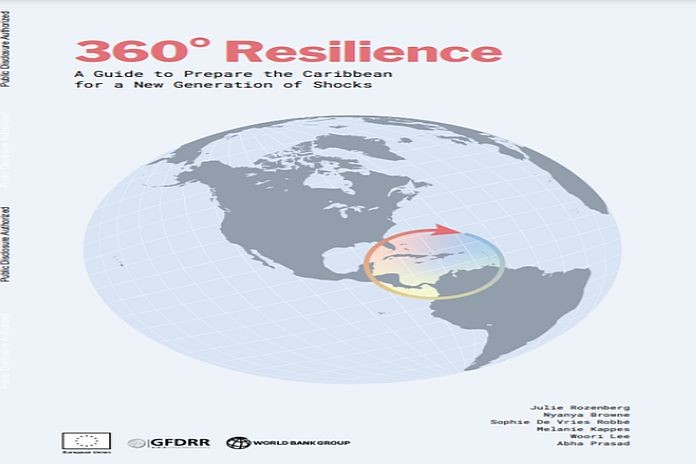WASHINGTON, USA – Strengthening government efficiency, empowering households and businesses, and reducing future risks by improving spatial planning and natural coastal protection are some of the key recommendations to boost the Caribbean’s ability to bounce back from shocks according to a new World Bank flagship report.
The report, 360° Resilience: A Guide to Prepare the Caribbean for a New Generation of Shocks, also concluded that the genuine progress of one of the world’s most natural hazard-prone regions in improving its resilience has so far often failed to produce inclusive economic growth.
The report, which covers 17 Caribbean countries, argues that a more comprehensive approach to resilience can help tackle the challenges posed by climate change, new diseases, and changing socio-economic contexts. It focuses on the different affected parties, from governments to individuals, to help countries in this region understand current strengths and weaknesses across sectors and identify priorities for building resilience to a new generation of shocks.
“Climate change is increasing the intensity and frequency of natural disasters. Other shocks, like the COVID19 pandemic, have made it clear that greater efforts are needed,” said Carlos Felipe Jaramillo, vice president of Latin America and Caribbean region, World Bank. “For the Caribbean, a region already vulnerable to external shocks, now is the time to better prepare for the natural disasters of the future.”
Just this year, hurricanes, tropical storms, earthquakes, and threats of volcanic eruption undermined Caribbean economies and livelihoods. Governments and the private sector, who understand well how vulnerable the region is to these threats, have got better at preparing for them. The major damage natural hazards cause to infrastructure and private sector activity are short-lived thanks to mechanisms in place to help economies recover rapidly. Governments have made great strides in investing in disaster preparedness, disaster risk financing, and regional early warning systems.
However, prior resilience strategies and efforts will not be enough to handle new and intensifying challenges given the volatility posed by climate change, environmental degradation, and changes in tourism demand, according to the report. For example, the number of people exposed to floods in the region increased 70 percent between 2000 and 2020 and will keep rising with climate change, while 72 percent of infrastructure assets are exposed to at least two hazards. Furthermore, under a moderate climate change scenario, 13 percent of seaside hotels could experience beach loss by 2050 due to sea level rise, and in some countries annual coastal protection costs could consistently exceed 5 percent of GDP.
“The long-term progress achieved by most Caribbean countries despite their high exposure to shocks is commendable,” said Lilia Burunciuc, World Bank Country Director for Caribbean Countries. “However, with the socioeconomic pain caused by the pandemic, the region is even more exposed. Despite progress, many countries in the region are constrained by high debt levels, poverty and human capital development challenges. These issues leave little room for increased government spending, but adaptation efforts are imperative to avoid more serious economic impact in the future.”.
In this context, the report stresses how these new challenges need a holistic approach to resilience across all sectors and actors, including innovation with technology. A more consistent approach is recommended, building on strong institutions, robust analytics, and more transparent prioritization.
“The report developed a traffic light system to help focus and prioritize actions, identify gaps, facilitate target setting, and monitor progress across the multiple aspects of resilience. It suggests a framework that governments and organizations can use to assess their resilience efforts,” said Julie Rozenberg, World Bank Senior Economist.
While this 360-degree approach to resilience needs to be tailored to each country’s specific context and chosen pathway toward recovery, the report urges Caribbean governments to focus on three main areas to boost resilience and better prepare for the shocks and stresses of the future:
-
- Increasing government efficiency by improving investment management and infrastructure maintenance, clarifying procurement rules, allocating budgets transparently, layering risk financing strategies, and giving greater attention to data and digitization.
- Empowering households and the private sector by increasing both the coverage and adequacy of social protection, strengthening worker skills, improving access to finance, and facilitating access to risk information.
- Reducing future physical risk by protecting natural barriers, better enforcement of building codes and standards, systematically considering emerging and changing risks, and planning to build back better after shocks.
This report was prepared by the World Bank and with support from the European Union in the framework of the Caribbean Regional Resilience Building Facility, managed by the Global Facility for Disaster Reduction and Recovery.
Download the 360˚ Resilience report: here.





